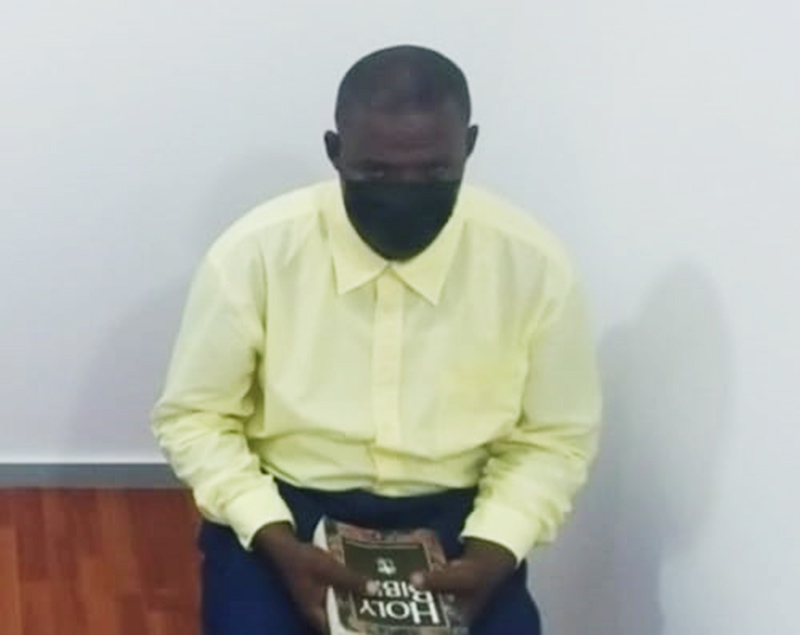Former Barama Company Limited supervisor Paul Abrams, who is currently serving a 25-year sentence, is of the view that his convictions for sodomizing and indecently assaulting a 17-year-old girl were “perverse,” given her chronology of events.
Convicted of those two counts which Abrams noted the complainant had said preceded the act of rape she alleged against him and for which he was found not guilty, his position is that the verdicts were perverse.
Abrams’ challenge to the convictions consumed the greater part of an almost two-hour hearing yesterday morning before the Guyana Court of Appeal, where his attorney Nigel Hughes questioned the plausibility of his client being convicted of the first two counts and not that of rape.
Given the sequence of events in which the complainant said she had been assaulted, Hughes’ contention is that, to have arrived at the conclusion it did, the jury would had to have found Abrams guilty of sodomizing and indecently assaulting the teen during the violent ordeal she detailed.
Underscoring the complainant’s chronology of the events, Hughes then reasoned that after that horrific ordeal, she then presumably consented to “sexual intercourse” since the jury found Abrams not guilty of raping the teen, which was the final act alleged by the complainant, to have been committed against her.
It is against this background Hughes described the verdict “perverse.”
In her rebuttal, however, Assistant Director of Public Prosecutions, Dionne McCammon advanced that the court could not go “behind” the jury’s verdict to ascertain why it arrived at the conclusion it did.
Describing it essentially an excursion for speculation, McCammon said the prosecution stands by the very chronology the complainant gave, but remained adamant it could not be known what or why the jury made the determination of the verdicts it did.
Those reasons she reminded are always only for the jury, and therefore the defence could not attempt to use it as a basis for describing a particular verdict as being perverse, even given the chronology of events related by the complainant.
The prosecutor surmised that the jury’s reasons may quite possibly have been varied, that no one besides the jury could profess to know.
To questions posed from acting Chancellor Yonette Cummings-Edwards, Hughes agreed that it is indeed the law that jurors are the sole judges of the facts, and are at liberty to find an accused guilty or not guilty of any amount of charges levelled against that person, all of the charges or even none of those charges.
The Chancellor then
presented for consideration, too, that a not-guilty verdict may not necessarily represent consent in the context of the contention raised by Hughes—but that it can quite possibly be among many other things also—including that the jury may not have believed that that particular act even occurred.
The Court so reasoned to illustrate that one could not “go behind” the verdict of the jury since, as the State advanced, it is not known why the jury made the findings it did.
Meanwhile, regarding the sentence which was advanced as being excessively severe, Hughes said that in accordance with recent case-law guidance from the apex Caribbean Court of Justice (CCJ), the sentence should be lesser.
McCammon, however, argued that Abrams’ case precedes the legal precedents to which the defence alluded, while adding that the accompanying aggravating factors of the manner in which the teen was assaulted, warranted the sentence imposed.
With hearings concluded, Chancellor Cummings-Edwards who is presiding over the appeal along with Justices of Appeal Dawn Gregory and Rishi Persaud, has announced that notices will be sent when the Court is ready to deliver its decision.
Back in 2016, a jury had convicted Abrams on charges of buggery and indecent assault which he committed on the teen in 2007.
Abrams and two other employees— Claude Craig and Holston Melville called ‘Pumpkin,’ had been charged with raping and sodomizing the young girl at Barama’s Land of Canaan, East Bank Demerara plywood plant.
They were accused of taking turns raping and sodomizing the teen on December 5th, 2007.
Abrams, was found not guilty of rape but guilty of buggery and indecent assault and was sentenced to 25 years imprisonment on the buggery charge and four years for the indecent assault; with the order that the sentences run concurrently.
It was the prosecution’s case that Abrams had lured the girl to a room where he proceeded to rape and sodomize her.
He reportedly then locked the girl in the room and later returned in the company of the other two employees who also proceeded to rape and sodomize her.
After some time elapsed, Abrams and Melville left the room, locking the girl in, once more. It was then Craig reportedly entered and sodomized the girl.
The charge of rape against Craig was withdrawn, but he was convicted and sentenced to four years for indecent assault.
Melville, however, had been found not guilty of all the charges.






